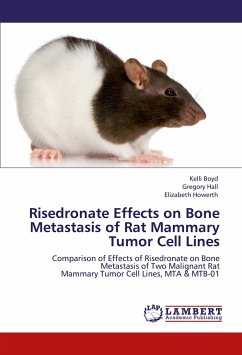
Risedronate Effects on Bone Metastasis of Rat Mammary Tumor Cell Lines
Comparison of Effects of Risedronate on Bone Metastasis of Two Malignant Rat Mammary Tumor Cell Lines, MTA & MTB-01
Versandkostenfrei!
Versandfertig in 6-10 Tagen
39,99 €
inkl. MwSt.

PAYBACK Punkte
20 °P sammeln!
When compared to MTA cells, MTB-01 cells were susceptible to risedronateinduced apoptosis, had decreased ability to bind to risedronate-treated bone, and did not produce MMP-2 or MMP-9 proteases. MTA cells were less susceptible to risedronateinduced apoptosis and produced MMP-2. Additionally, adhesion of MTA cells to bone matrix was not diminished by risedronate treatment. Our results suggest that the nonresponsive nature of the MTA cell line may be due to MMP-2 production (possibly allowing ongoing destruction of risedronate-treated bone), continued adhesion to risedronate-treated bone matrix...
When compared to MTA cells, MTB-01 cells were susceptible to risedronateinduced apoptosis, had decreased ability to bind to risedronate-treated bone, and did not produce MMP-2 or MMP-9 proteases. MTA cells were less susceptible to risedronateinduced apoptosis and produced MMP-2. Additionally, adhesion of MTA cells to bone matrix was not diminished by risedronate treatment. Our results suggest that the nonresponsive nature of the MTA cell line may be due to MMP-2 production (possibly allowing ongoing destruction of risedronate-treated bone), continued adhesion to risedronate-treated bone matrix, and decreased susceptibility to risedronate-induced apoptosis.












